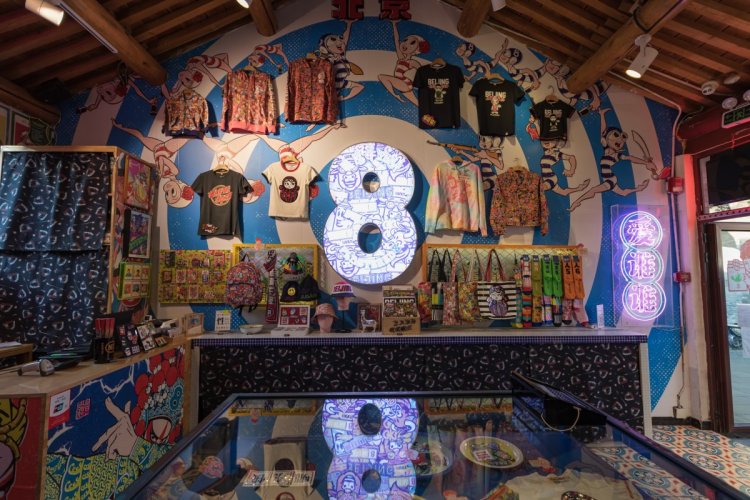Lanlord-Tenant Tensions Simmer on Nanluogu Xiang
Nanluogu Xiang was made for days like these, when sunlight sieves through russeting leaves and visitors toddle to and fro as if their internal stoplight was stuck on amber. Walking around, it’s not hard to imagine how this hutong caught the attention of would-be shop owners six years ago. And it's also clear why landlords are constantly trying to raise rents: this place has become a bona fide tourist magnet.
It’s no longer a question of whether Nanluogu Xiang will become commercialized; it already is, as reflected by the increasing number of copycat products and escalating property values. And with a car park coming "quite soon," according to Plastered T-shirts owner Dominic Johnson-Hill, the never-ending battle between art and commerce is escalating on the Nanluogu Xiang front: on one side, creative types who built the alley’s brand; on the other, an older generation of Chinese homeowners who are understandably practical about maximizing profits.
We'll preface this next part by pointing out that not all landlords are money gougers, and not all renters are the greatest tenants. Many, for example, sublet commercial spaces on the street without their landlord’s approval.
But the story of King Tai and the ordeals of his well-known Korean restaurant, Saveurs de Corée, is illustrative of the tensions simmering on Nanluogu Xiang between some of the older businesses and property owners, and goes to show how quickly landlord-tenant relationships can deteriorate, to everyone's detriment.
When theBeijinger.com spoke to King in April about escalating rents on Nanluogu Xiang, he expressed optimism that his landlord would renew his lease when it expired in May 2011. “We love this hutong,” he said. That optimism, King says, is now “completely gone.”
Sitting inside his popular restaurant, King says that on May 5 his landlord, Chen Wei, dropped by to offer a lease renewal: a five-year contract fixed at RMB 428,000 per year. This was a substantial increase over King’s current contract of RMB 160,000 a year, but it was tenable enough that King said he’d think about it. He wondered if this wasn’t a turning point in his previously frosty relationship with Chen. Over Mid-Autumn Festival, he even bought Chen’s family moon cakes for the first time.
According to King, when the two men happened upon each other again three weeks ago, all former pleasantries were gone. Chen said the offer was off the table because King had taken too long to give a formal answer. The rent would now start at RMB 460,000 a year, with yearly increases. The two argued, and when Chen blurted out that King was “good for nothing,” the Rubicon had been crossed.
The final bridge was burned last Monday (November 1), when King claims Chen “did this kung-fu kick, probably five times,” to a wall the Kings had erected in front of a kitchen door. King claims the wall was for hygienic purposes, to keep the kitchen door from constantly being opened. Chen saw this act as property defacement. What the two sides do agree is on is that reconciliation now seems impossible.
As I wrapped up my conversation with King, a potential future tenant walked in to check out the space before ducking out into a black Mercedes. King and I went outside and were inspecting the kitchen door when Chen’s wife sidled up next to us. A moment later, Chen Wei, a sturdy middle-aged man, appeared.
I introduced myself and said I had a few questions. “I am the landlord,” he replied, firmly. “I have nothing to say to you.”
Quarrelsome landlord-tenant relationships certainly aren’t unique to China, but the prevalent sense is that Nanluogu Xiang's homeowners all speak to each other, owing to their status as longtime hukou-carrying Beijing neighbors, and all know each other's revenues -- and think they should be making more. Unfortunately, with each creative type that gets squeezed out, the Nanluogu Xiang brand loses a bit of its lifeblood; it’s now common to see printed-over Zoo Market shirts and equally cheap trinkets sold out of boutiques.
A 10-member “chamber of commerce” consisting of Nanluogu Xiang shopkeepers has been trying to push back. Xu Yan, chamber president and owner of Taste, says they are taking a three-pronged approach: petitioning the local government to subsidize costs for small business owners, facilitating communication with landlords, and warning prospective shopkeepers that profit is not guaranteed on Nanluogu Xiang. “But so far,” he admits, “We’re not hopeful that there’s one really good solution.”
The only thing to do may be to wait. "Maybe the landlords will tire of the hassle of dealing with new tenants all the time, and the rents will go back down," Xu says.
It may not be all gloom and doom, though. Johnson-Hill, also a chamber of commerce member, has a business plan that offers hope for others. He maintains a great relationship with his landlord, partly because she works for him in his shop, and he has this advice for shopkeepers: “Continually recreate. People love creative products on Nanluogu Xiang. If you create something different here, it’s the perfect platform to sell.”
King will have to take those words to heart -- and there's reason to believe he'll be okay. He and his wife left Hong Kong in 2006 partly because they wanted a "more spacious" place to raise a daughter who was on the way, but also because they were following a dream. The two loved dining out and cooking, and though they had no business experience, they had always wanted to open a restaurant.
One of the first places in Beijing King ate at was Fish Nation, then one of only a few commercial paces open on what was an overlooked, unknown hutong.
"I was very impressed," King recalls. "It was a very quiet hutong then, but I felt it was so charming. To see all these Chinese rooftops, and eating upstairs, being able to grab a pint of lager and having fish and chips overlooking this really tiny setting, was very, very impressive for me. I just asked myself, why was I in Beijing? And now, right in front of me was this perfect hutong view."
He opened his place next to Fish Nation. The two would be neighbors until March of this year, when Fish Nation shuttered its doors.
Related stories :
Comments
New comments are displayed first.Comments
![]() antfarmks5
Submitted by Guest on Wed, 11/10/2010 - 10:30 Permalink
antfarmks5
Submitted by Guest on Wed, 11/10/2010 - 10:30 Permalink
Re: Lanlord-Tenant Tensions Simmer on Nanluogu Xiang
Correction: King-Tai moved to Beijing in 2005 (it was in '06 that he opened his restaurant).
Validate your mobile phone number to post comments.


